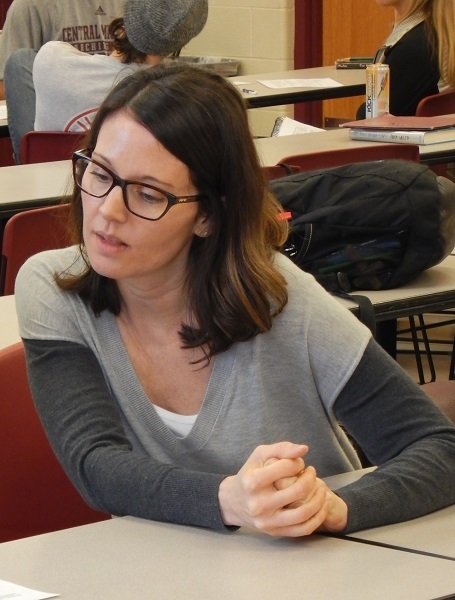Equipping Educators
 CMU English professor Dr. Carlin Borsheim-Black researches instruction of antiracist literature to help English teachers increase their students’ understanding of racism. Her newly published book, Letting Go of Literary Whiteness: Antiracist Literature Instruction for White Students, written in collaboration with Dr. Sophia Tatiana Sarigianides from Westfield State University, outlines their strategies and framework for antiracist literature instruction.
CMU English professor Dr. Carlin Borsheim-Black researches instruction of antiracist literature to help English teachers increase their students’ understanding of racism. Her newly published book, Letting Go of Literary Whiteness: Antiracist Literature Instruction for White Students, written in collaboration with Dr. Sophia Tatiana Sarigianides from Westfield State University, outlines their strategies and framework for antiracist literature instruction.
The challenge of antiracist literature instruction was brought to Dr. Borsheim-Black’s attention nearly 20 years ago as a high school English teacher. Her curriculum, which included novels like To Kill a Mockingbird, A Raisin in the Sun, House on Mango Street, and Fences, stirred the curiosity of her students and sparked frequent conversations about racism in her classroom. Because she was not trained to address racism directly, she was challenged to facilitate these discussions.
During her graduate studies at Michigan State University, Dr. Borsheim-Black performed a research study of antiracist literature instruction in hopes of finding a solution to her challenge as an English teacher. She traveled across Michigan to interview English teachers and observed their classrooms during discussions of racism in literature. Dr. Borsheim-Black learned that many teachers experienced the same predicament she did years ago; teachers felt eager to discuss racism with their students but were uncertain of the best way to lead the discussion. Some teachers felt they did not grasp the complexity of racism well enough to teach others about it, while others feared backlash from parents and administrators. Concerns of classrooms becoming heated with disagreements between students also stood in the way. Because of these fears and reservations, the complexities of racism are often brushed over, leaving students with unanswered curiosity and limited understanding of racism.
Using what she learned from their research study, Dr. Borsheim-Black, together with Dr. Sarigianides, developed a framework and strategies for antiracist literature instruction. Their book outlines various techniques including a strategy that encourages teachers to identify race concepts central to the literature they are teaching. With a concrete concept for students to grasp rather than an opinion to debate, teachers can help their students meet specific racial literacy objectives that help students understand the literature they are reading, as well as the ways racism impacts their own lives.
Many professionals recognize the value within the pages of the book. Dr. Borsheim-Black and Dr. Sarigianides have received requests from English teachers, English departments, school districts, and universities to discuss their book and lead professional development workshops. They were also nominated for a Grawemeyer Award in Education, which is a recognition of work with the potential to bring about significant improvement in educational practice for teachers and students. Dr. Borsheim-Black and Dr. Sarigianides plan to continue their research of antiracist literature instruction to make further impacts on classrooms near and far.
At CMU, we do research and real-world results.
Story by ORGS intern Brittney Rudat
April 2021